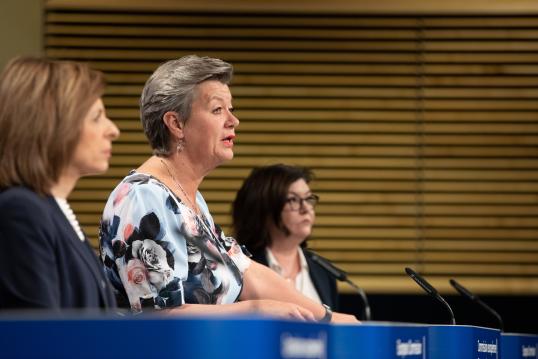We’ve now had about eight weeks of corona measures in Europe. People are bearing the lockdown with resolution, determination and responsibility. But people who have lost their jobs, their income – they want to work again. And everyone is starting to feel a little cabin fever. People want to get out of their houses, go shopping, get a badly needed haircut, and above all, see friends and family. Children want to go to school again and see their friends.
And we want to travel again, across borders. Sometimes you don't know what you've got until it's gone. We now really feel what freedom of movement means. Friends and family are separated by internal borders and miss each other. Students want to know if their Erasmus exchange will go ahead. Businesses miss their customers from across the Union. The summer holidays are coming up, people are dreaming of exploring and relaxing in the cities, countryside, forests, and beaches of Europe.
This summer will not be like any other summer we’ve ever had – we have to be honest about that.
But it’s good news that we’re starting to get the spread of the virus under control. And that countries are now starting to lift restrictions on our daily lives, slowly and carefully.
We can slowly start to get Europe moving again – while avoiding triggering a second wave of infections which would require the reintroduction of possibly more rigorous measures. Yesterday, I presented guidance for a phased and coordinated approach for restoring freedom of movement and lifting of internal border controls.
Three conditions apply:
- Public health and individual lives come first. The epidemiological situation must be developing in a positive way, both regarding the spread of the virus and the capacity of the health care system. Areas, regions or Member States that are in a similar positive situation can start to lift restrictions first. There should also be enough capacity in terms of hospitals, testing, surveillance and contact tracing capacities.
- Containment measures, including physical distancing. Safe travel in Corona times means: keeping your distance, which has to be possible from beginning to end of your journey. If this is impossible, additional safeguards are essential – such as masks, contact tracing, health checks, and continued public information campaigns about the importance of handwashing and other measures.
- Social and economic considerations. We first need to protect people’s lives. But we must also protect people’s livelihoods. Because of the virus, we face the biggest recession in EU history. Restrictions should be effective, but they must also be proportionate and not go beyond what is necessary to contain the pandemic and protect public health. Cross border workers need to be able to go to work. Families torn apart by restrictions need to be reunited. Seasonal workers in agriculture need to be able to get to the fields where they are needed.
There’s one golden rule: non-discrimination. Neighbouring countries should lift restrictions based on objective criteria, related to the virus. Not on nationality or proximity. If a Member State lifts restrictions on movement to and from another Member State, or regions or areas, this must apply, without discrimination, to all EU citizens and to all residents of that Member State. Regardless of their nationality.
Member States will assess the situation in their country, and when they decide to remove restrictions, they should do it in phases. First between areas, regions and Member States with a similar, positive health situation. In the next phase, as conditions improve, we’ll see a general lifting of restrictions and border controls. Health measures like handwashing and social distancing will remain in place for quite some time.
EU Member States will not lift restrictions all at once, with everybody, or at the same time. They will closely monitor the situation, and if necessary be ready to take a few steps back. But whatever they do, they should take their steps in close coordination with each other and the European Commission, like we have done with increasing decisiveness and effectiveness for the last eight weeks.
Details
- Publication date
- 14 May 2020
- Author
- Directorate-General for Communication

